Opinion
Valorising mythology to invalidate known history
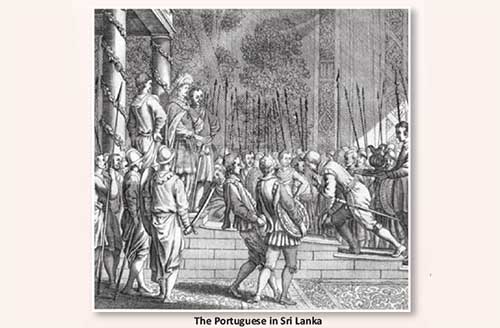
By ROHANA R. WASALA
Feisal Mansoor (‘Muslims and ban on cattle slaughter’/The Island/October 9, 2020) opens his piece with a quote from Mahatma Gandhi, obviously taken from the web: “The greatness of a nation and its moral progress can be judged by the way its animals are treated.” However, there is some doubt about the authenticity of that alleged Gandhi quote, because it is not traceable to his writings or his speeches according to quote-researchers; besides, he was usually better known for his great concern for the weak members of human society than for animals. But even if someone just imagined it, there’s no harm done, for the expression of concern for animal welfare attributed to Gandhi, can be easily supported by what we know about him as a champion of non-violence. But the problem here is this: Whether genuine or fake, the Gandhi quote has little or no relevance to the truth that FM’s arbitrary opinions about Sri Lanka’s ‘ancient culture’ misrepresent or conceal, in favour of something else. He seems to completely ignore the millennia long recorded history of the island, which is almost entirely coterminous with its established Buddhist religious culture and is inseparable from it. (Incidentally, the spirit of secularism and democracy that it encourages in governance is a distinctive feature of the country’s majority Buddhist culture; but this is something difficult for most believers of other religions and Sri Lanka-baiters to understand or appreciate.) The greatness of our culture is that it is absolutely tolerant and accommodating towards minority cultures, subject to the implicit legitimate condition that they don’t try to make undue inroads into its space or to subvert it in other ways. To me it looks like FM’s statements are meant to distort, rubbish, and obviate, if possible, Sri Lanka’s ancient Sinhala Buddhist cultural heritage. Is the Gandhi quote meant to imply that our nation has no claim to greatness, and that our treatment of animals falls short of required moral standards observed in civilized countries?
Having said that, it must be stated with emphasis that it is perfectly alright for FM to try to share his personal convictions with others. That is his right as a free citizen. I am enjoying here the same right to articulate my reaction as a Sri Lankan to his views about the ancient history and culture of our beloved Motherland.
First of all, let’s be clear about this: At the very inauguration (i.e., in official terms) of the Buddha Sasana in the island of Lanka, Buddhist missionary Arhant Mahinda Thera admonished the monarch of the land king Devanampiya Tissa in 236 BCE (2256 years ago) thus as recorded in the Mahavamsa (Chapter XIV):
“O great king, the beasts that roam the forest and the birds that fly the skies have the same right to this land as you. The land belongs to the people and to all other living things, and you are not its owner but only its guardian.”
Isn’t this considerably before today’s animal rights protectors, animal ‘status’ guarantors, animal welfare standard maintainers, and various other ‘a fair deal for animals’ worriers, represented in organizations that annually celebrate the World Wildlife Day (March 3), World Animal Day (October 4), etc., at some cost, started talking about the subject?
Compassionate treatment of all sentient beings is an ideal that people brought up in our culture, take for granted. Of course, there are instances where the ideal is observed in the breach. That is human nature. A whole society should not be judged on the basis of the behaviour of a few individuals, who could themselves be victims of circumstances.
FM’s first paragraph is an attempted fusion of the Ravana myth and his religious beliefs, to the exclusion of the historically factual Buddhist element. That Ravana flew his ‘dandu monara yanaya’ (wooden peacock aircraft) and abducted Seetha from what is now called India, is a story. Not even children take that as proven history, but it is a wonderful story, wherever or whenever it originated. Talking monkeys, animal fortune tellers, and other human personality attributed birds and beasts are common in literature in all cultures. The stories that compose our Jataka Potha are shared property in various North Indian literary traditions. The Sanskrit ‘Panchatantra’ from India, interweaves five skeins of moral traditions into a single text composed of stories in which so many animals feature, invested with human qualities. We have a number of talking, philosophising, admonishing birds in Geoffrey Chaucer’s Canterbury Tales.
FM writes: “As Creation is the supreme force in the universe, the beneficence of life and its comprehension through love, is to facilitate as many expressions of life as possible.” That belief is not shared by the predominant religious culture of our country, but is not targetadly criticised or attacked so as to hurt others’ religious beliefs or sentiments. There is evidence that our ancestors ‘worshipped’ the sun as the source of all life, especially plant life, hence important for agriculture. If they deified the sun, it was very meaningful. That ancient religious tradition survives today in the secular Surya Mangalyaya or the Sinhala Aluth Avurudda, held in the month of Bak (Felix/Lucky) in the Sinhala calendar. The ignorant insensitive British colonial authorities arbitrarily renamed it Sinhala Hindu New Year for their own purposes. Tamils and Sinhalese can and do live peaceably together, while observing their separate culturally distinctive festivals. Whether our ancestors called themselves Aryans because they were sun worshippers is highly improbable. Aryans were a white skinned race.The Sinhalese are not. It is not impossible that the Swastika – a sign that symbolizes the Sun was later appropriated by those white people, including Adolf Hitler. The legendary Vijaya of the Mahavamsa could have descended from such a tribe, but that origin story is not accepted today. Newly available archaeological evidence provides proof that our ancestors were a civilised a people (with their pure dark skin) even during the time of the Buddha, and that there were lay Buddhists and Buddhist monks before the arrival of Arahat Mahinda; whose coming appears to have been the result of an official diplomatic mission; he and his retinue were, most probably, royal emissaries from Emperor Asoka’s court as much as Buddhist missionaries. (Read between the lines, the Mahavamsa passages support this impression.)
FM’s reference to Aldous Huxley needs a comment. In the Maha Parinibbana Sutta, the Buddha tells the monks: ‘Atta dipa viharatha’ – ‘Be islands unto yourselves’, meaning you are your own saviour, that is, ‘Realise Nibbanic Bliss, put an end to samsaric suffering, through your own effort’ (which is not beyond you, if you are diligent enough). Writer and brilliant intellectual Aldous Huxley might have independently arrived at this island metaphor to describe his own illusion of self, elusive self-identity. The contemplative W.B. Yeats, himself no mean intellectual, expressed it as ‘How can we know the dancer from the dance?’ It is also possible that both of them came across this idea in Buddhist literature.
Apparently, FM mistakes this profound idea for selfish self-absorption. In his confusion, he imports the phrase ‘enlightened self-interest’ that Adam Smith (considered the ‘father of modern economics’) coined to express his idea that by pursuing one’s own economic benefit one ultimately contributes to the good of others as well, without probably intending to do so. (But it can be thought that he tried to elaborate it as a morally acceptable concept, rather than as a coldly amoral economic one.) However, that is something very different from the Buddhist idea of working for the benefit and wellbeing of others without expecting a reward, generosity or altruism.
FM has written:
“As such, enlightened self-interest is the only personal inquiry we can make, with the all- important caveat that in our self-discovery we may not interfere with anything else’s self-discovery.”
He may be seen as giving idiosyncratic twists to the terms ‘enlightened self-interest’ and ‘self-discovery’, which are actually technical terms in their respective characteristic contexts. FM also makes a confusing verbal medley out of words like ahimsa, Dhamma, and Mahasammata. These are words charged with meaning and emotion for Buddhists. ‘Mahasammata’ (the Great Elect/the Universally Chosen One/The People’s Choice) occurs in Chapter II of the Mahavamsa as the earliest genealogical ancestor of the Buddha (and humankind, probably) who lived countless aeons ago. For Sinhalese Buddhists ‘Mahasammata’ is not a historical figure; he is the legendary first king on earth. In the Agganna Sutta (On Knowledge of Beginnings) the Buddha mentions Mahasammata as the first ruler who was appointed, based on his handsome appearance and moral strength, by common consent, to rule over the group of rice growers that was the loosely formed human society then. He was tasked to prevent stealing, to punish the miscreants by banishing, etc. Mahasammata was given a share of the rice crop as payment for his service. Actually, the Agganna Sutta can be interpreted as a scientific account of an alternately expanding and contracting universe, and a gradually evolving earth; and much later anatomically modern humans and organized human societies emerging on earth. There is no talk of a creator or creation, which FM takes for granted. Dharma is what the Buddha preached. Ahimsa is the ideal of nonviolence that is common to most Indian religions, including principally, Hinduism, Jainism, and Buddhism.
Next, FM quotes two passages from the book ‘Portuguese Encounters with Sri Lanka and the Maldives’ edited by C.R. de Silva, Ashgate, 2009, to assert “that there was no slaughter of cattle in Lanka prior to colonisation”. It is ridiculous in this trivial context to quote from an eminent historian like the professor mentioned. These encounters took place in the 16th to 17th centuries. The book is a scholarly collection of writings taken from Portuguese histories and archives in translation combined with those from local sources. Publishers say: “These documents contribute to the growing understanding that different groups of European colonizers – missionaries, traders and soldiers – had conflicting motivations and objectives. Scholars have also begun to emphasize that the colonized were not mere victims but had their own agendas and that they occasionally successfully manipulated colonial powers.” (I took this extract from Google.com- RRW)
So, the book shows that the natives of these countries matched those invading European interlopers bent on ‘temporal and spiritual conquest’ in their cunning and countervailing skills. They were not half-civilized savages. By the way, I don’t think FM found himself nodding in agreement when reading sentences like the following written by an ignorant Portuguese scribe:
“… In this country there are many false beliefs sown by the devil, and to eradicate them there is a need for much time and trouble…..” (This must be a reference to local Buddhist and Hindu religious beliefs of the time; but the colonizers were too uneducated and uncultured to understand that Buddhism and Hinduism are not ‘religions’ in their sense of the term, and that religion in the colonizers’ sense was, as it still is, a facile superstition to Buddhists. – RRW)
“They (some native people who didn’t kill even the meanest of creatures) do not eat bread, however hungry or needy they might be. Their food is made up of the leaves of a certain creeper (betel leaves) that climbs other trees like ivy. These leaves are smeared with the same kind of lime that they use for whitewashing their houses…”
“There is another class of people that eats fowl and wild boar and deer, but does not eat the flesh of cows, since they believe their souls enter into cows after death; they will never kill a cow and eat its flesh…”
It looks like FM has missed this book: ‘A 16th Century Clash of Civilizations: The Portuguese Presence in Sri Lanka’ by Susantha Goonatilake, 2010. It gives a clear assessment of the effects of the Portuguese colonial presence in our country, which was actually ahead of those European invaders in terms of human civilization. The Portuguese went to Sri Lanka in compliance with a papal bull.
FM makes extremely fallacious claims like the following about his fictitious ‘Lanka of Mahasammata’:
“A vocational caste system handed down secrets to successive generations, in a system where one’s knowledge was one’s wealth, with the Divine as the Supreme Master of one’s craft, one performs one’s duty with an aim to perfection in union of mind and spirit so each attempt brought one closer to the Ultimate Prize.” (Divine as the Supreme Master of one’s craft, Ultimate Prize, What are these?)
“In a land ruled by the Unseen King, in both metaphor and practise, the King embodies Mahasammata and sets the standard for the people”. (There was no Mahasammata in our country’s history. I explained the ‘Mahasammata’ concept above. Who is this Unseen King, FM? Surely a figment of your imagination?)
“The people know that if they live in dhamma, Dhamma would protect them, and the land would be safe”. (This is a misinterpretation of the piece of wisdom which runs in Pali: ‘dhammo have rakkati dhammacarim’ ‘The Dhamma protects the one who lives by the Dhamma’. There’s no protective magic or divine intervention here. But don’t take it literally. You may be sure you live according to the Dhamma. But be mindful enough not to stand in front of an oncoming train.)
The rest of FM’s article makes even less sense. From this point onwards, I fail to find anything in FM’s article worth talking about. The next to nothing he has to say about the subject proposed in his title is: ” I believe that as a Sri Lankan Muslim, it is incumbent on me to respect the mores of my compatriots and to live in a way that will lead to greater social cohesion, amity and unity of purpose…” That is a harmless thought, but I for one do not believe that pre-colonial Sri Lanka was paradise on earth. Besides, that sentiment runs in the face of what FM has been trying to prove to the very end.
- News Advertiesment
See Kapruka’s top selling online shopping categories such as Toys, Grocery, Flowers, Birthday Cakes, Fruits, Chocolates, Clothing and Electronics. Also see Kapruka’s unique online services such as Money Remittence,News, Courier/Delivery, Food Delivery and over 700 top brands. Also get products from Amazon & Ebay via Kapruka Gloabal Shop into Sri Lanka.
Opinion
Take Human Rights seriously, not so much the council or office
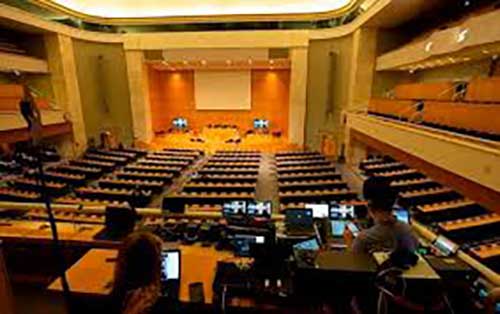
By Dr Laksiri Fernando
The 46th Session of the UN Human Rights Council started on 22 February morning with obvious hiccups. The Office, to mean the Office of the UN High Commissioner for Human Rights, finally decided to hold all sessions virtually online, only the President of the Council and the assistants in the high table sitting at the UN Assembly Hall in Geneva. The President, Ms. Nazhat Shammen Khan, Ambassador from Fiji in Geneva, wearing a saree, was graceful in the chair with empty seats surrounding.
In the opening session, the UN General Assembly President, UN General Secretary, UN High Commissioner for Human Rights, and Head of Foreign Affairs, Switzerland (as the host country), addressed remotely the session. In fact, there was no need for Switzerland to have a special place, as the UN is independent from any host country. Switzerland is fairly ok, however, if this tradition is followed, the UN General Assembly may have to give a special place to the US in New York.
Initial Addresses
UN General Secretary, Antonio Guterres’ address could have been quite exemplary if he gave a proper balance to the developed and developing countries. He talked about racism and fight against racism but did not mention where racism is overwhelmingly rampant (US and Europe) and what to do about it. Outlining the human rights implications of Covid-19 pandemic, he made quite a good analysis. It was nice for him to say, ‘human rights are our blood line (equality), our lifeline (for peace) and our frontline (to fight against violations).’ However, in the fight against violations, he apparently forgot about the ‘blood line’ or the ‘lifeline’ quite necessary not to aggravate situations through partiality and bias. He never talked about the importance of human rights education or promoting human rights awareness in all countries.
His final assault was on Myanmar. Although he did not call ‘genocide,’ he denounced the treatment of Rohingyas as ethnic cleansing without mentioning any terrorist group/s within. His call for the release of Aung San Suu Kyi and other civilian leaders undoubtedly should be a common call of all. However, he did not leave any opening for a dialogue with the military leaders or bring back a dialogue between Aung San and Min Aung, the military leader. With a proper mediation, it is not impossible. Calling for a complete overhaul as the young demonstrators idealistically claim might not be realistic.
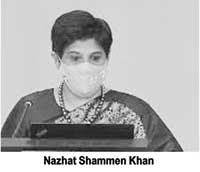 High Commissioner Michelle Bachelet’s address was brief and uncontroversial this time without mentioning any country or region. It is clear by now perhaps she is not the real author of the Report against Sri Lanka, but someone probably hired by the so-called core-group led by Britain. Her major points were related to the coronavirus pandemic trying to highlight some of the socio-economic disparities and imbalances of policy making that have emerged as a result. The neglect of women, minorities, and the marginalized sections of society were emphasized. But the poor was not mentioned. As a former medical doctor, she also opted to highlight some of the medical issues underpinning the crisis.
High Commissioner Michelle Bachelet’s address was brief and uncontroversial this time without mentioning any country or region. It is clear by now perhaps she is not the real author of the Report against Sri Lanka, but someone probably hired by the so-called core-group led by Britain. Her major points were related to the coronavirus pandemic trying to highlight some of the socio-economic disparities and imbalances of policy making that have emerged as a result. The neglect of women, minorities, and the marginalized sections of society were emphasized. But the poor was not mentioned. As a former medical doctor, she also opted to highlight some of the medical issues underpinning the crisis.
Then came the statements from different countries in the first meeting in the following order: Uzbekistan, Colombia, Lithuania, Afghanistan, Poland, Venezuela, Finland, Fiji, Moldova, Georgia, Kazakhstan, Equatorial Guinea, Vietnam, Belgium, and Morocco. The obvious purposes of these statements were different. Some countries were apparently canvassing for getting into the Human Rights Council at the next turn perhaps for the purpose of prestige. Some others were playing regional politics against their perceived enemies. This was very clear when Lithuania and Poland started attacking Russia.
But there were very sincere human rights presentations as well. One was the statement by the President of Afghanistan, Mohammad Ashraf Ghani. He outlined the devastating effects that Afghanistan had to undergo during the last 40 years, because of foreign interferences. The initial support to Taliban by big powers was hinted. His kind appeal was to the UN was to go ‘beyond discourse to practice’ giving equal chance to the poor and the developing countries to involve without discrimination.
Controversial Presentations
China’s Foreign Affairs Minister, Wang Yi, made his presentation almost at the end of the first day. This is apparently the first time that China had directly addressed the Human Rights Council. Beginning with outlining the devastating repercussions of the coronavirus pandemic he stressed that the world should face the challenges through ‘solidarity and cooperation.’ He broadened the concept to human rights solidarity and cooperation. His expressed views were quite different to the others, particularly to the Western ones.
He frankly said that what he expresses are the views of China on human rights without claiming those are absolute truths or forcing others to believe or implement them. There were four main concepts that he put forward before the member countries. First, he said, “We should embrace a human rights philosophy that centres on the people. The people’s interests are where the human rights cause starts and ends.” Second, he said, “we should uphold both universality and particularity of human rights. Peace, development, equity, justice, democracy, and freedom are common values shared by all humanity and recognized by all countries.” “On the other hand,” he said, “countries must promote and protect human rights in light of their national realities and the needs of their people.”
“Third,” he said, “we should systemically advance all aspects of human rights. Human rights are an all-encompassing concept. They include civil and political rights as well as economic, social, and cultural rights.” He then emphasized, “Among them, the rights to subsistence and development are the basic human rights of paramount importance.” Fourth, “we should continue to promote international dialogue and cooperation on human rights. Global human rights governance should be advanced through consultation among all countries.”
It was on the same first day before China, that the United Kingdom launched its barrage against several countries not sparing Sri Lanka. The Foreign Secretary, Dominic Raab, delivered the statement from top to bottom attacking alleged violating countries on human rights. But there was no mentioning of Israel for the repression of Palestinians or the systemic racism rampaging in the United States, including the 6 January attacks on the Capitol by extremist/terrorist groups.
His first sermon was on Myanmar without acknowledging the British atrocities or mismanagement of this poor and diverse country during the colonial period. He was quite jubilant over implementing sanctions and other restrictions over the country. Many sanctions, in my opinion, are extortions. Undoubtedly, Aung San Suu Kyi and other leaders should be released, and democracy restored. This is a task of the whole council and when one or two countries try to grab the credit, there can be obvious reservations of others.
His further scathing attacks were against Belarus, Russia, and China. Some appeared factually correct but not necessarily the approach or the motives genuine. The following is the way he came around Sri Lanka. He said,
“Finally, we will continue to lead action in this Council: on Syria, as we do at each session; on South Sudan; and on Sri Lanka, where we will present a new resolution to maintain the focus on reconciliation and on accountability.”
‘Action’ to him basically means repeatedly passing resolutions, of course imposing economic and other sanctions. He said, “as we do at each session”; like bullying poor or weak countries at each session. Can there be a resolution against Russia or China? I doubt it.
What would be the purpose of presenting a resolution against Sri Lanka? As he said, “to maintain the focus on reconciliation and on accountability.” This will satisfy neither the Tamil militants nor the Sinhalese masses. But it might satisfy the crafty Opposition (proxy of the defeated last government). This is not going to be based on any of the actual measures that Sri Lanka has taken or not taken on reconciliation or accountability. But based on the ‘Authoritarian and Hypocritical Report’ that some anti-Sri Lankans have drafted within the Office of the High Commissioner for Human Rights. This what I have discussed in my last article.
In this context, successful or not, the statement made by the Sri Lanka’s Minister of External Affairs, Dinesh Gunawardena, in rejecting any resolution based on the foxy Report of the Office of the UN High Commissioner for Human Rights, in my concerned opinion, is absolutely correct.
Opinion
President’s energy directives ignored by the Power Ministry: Another Point of View

Dr Tilak Siyambalapitiya
Dr Janaka Rathnasiri laments (The Island 19 Feb 2021) that the Power Ministry has ignored the President’s directive to draw 70% of energy from renewable sources by 2030. I saw the approved costs of electricity production for 2019, published by the Public Utilities Commission (PUCSL).
PUCSL has also approved the prices to sell electricity to customers. Although various customers pay at various “approved” prices, the average income from such “approved” prices in 2019 was Rs 17.02 per unit. It is not only the Ministry, according to Dr Rathnasiri, ignoring the President; PUCSL is also breaking the law, which says prices and approved costs should be equal.
 So there is already an illegal gap of Rs 21.59 minus 17.02 = Rs 4.57 per unit of electricity sold. If electricity prices are not to be increased, as stated by many in the government and PUCSL, let us say the following: Distribution costs should decrease by 0.57 Rs per unit. Generation costs should decrease by Rs 4.00 per unit.
So there is already an illegal gap of Rs 21.59 minus 17.02 = Rs 4.57 per unit of electricity sold. If electricity prices are not to be increased, as stated by many in the government and PUCSL, let us say the following: Distribution costs should decrease by 0.57 Rs per unit. Generation costs should decrease by Rs 4.00 per unit.
PUCSL also published the approved cost of purchasing or producing electricity from various sources for 2019. The actual energy values were different to what was approved, but let us stick to PUCSL approved figures:
I suggest Dr Rathnasiri fills-up the following table, to show how much electricity will cost in 2030 to produce and deliver, if the President’s 70% target is to be achieved and for PUCSL to abide by the law. Let us assume that electricity requirement in 2030 will be double that of 2019.
 Since PUCSL has to save Rs 4 from 13.92, the average selling price for energy should be Rs 13.92 minus 4.00 = Rs 9.92. With a target network loss of 7% (in 2019 it was 8.4%), the average cost of production has to be Rs 9.27 per unit. Eight cages have to be filled-up by Dr Rathnasiri.
Since PUCSL has to save Rs 4 from 13.92, the average selling price for energy should be Rs 13.92 minus 4.00 = Rs 9.92. With a target network loss of 7% (in 2019 it was 8.4%), the average cost of production has to be Rs 9.27 per unit. Eight cages have to be filled-up by Dr Rathnasiri.
In 2012, PUCSL approved the energy cost of electricity produced from coal power to be 6.33 Rs per kWh. In 2019, PUCSL approved 9.89 (56% increase). For renewable energy, it was 13.69 in 2012, and 19.24 in 2019 (a 40% increase, but double the price of electricity from coal fired generation). In 2012, rooftop solar was not paid for: only give and take, but now paid Rs 22, against Rs 9.89 from coal. There seems to be something wrong. The price reductions of renewable energy being promised, being insulated from rupee depreciation, are not happening? Either Sri Lanka must be paying too little for coal, or it may be renewable energy is severely over-priced?
On coal we hear only of some corruption every now and then; so Sri Lanka cannot be paying less than it costs, for coal.
Enough money even to donate
vaccines
 Another reason for the Ministry of Power to ignore the President’s directive may be the Ministry’s previous experience with similar Presidential directives. In 2015, the President at that time cancelled the Sampur coal-fired power plant, and the Ministry faithfully obliged. That President and that Prime Minister then played ball games with more power plants until they were thrown out of power, leaving a two-billion-dollar deficit (still increasing) in the power sector. Not a single power plant of any description was built.
Another reason for the Ministry of Power to ignore the President’s directive may be the Ministry’s previous experience with similar Presidential directives. In 2015, the President at that time cancelled the Sampur coal-fired power plant, and the Ministry faithfully obliged. That President and that Prime Minister then played ball games with more power plants until they were thrown out of power, leaving a two-billion-dollar deficit (still increasing) in the power sector. Not a single power plant of any description was built.
Where is this deficit? You do not have to look far. In the second table, replace 24.43 with 9.89, to reflect what would have happened if Sampur was allowed to be built. The value 12.79 will go down to 8.55, well below the target of Rs 9.27 per unit to produce. Not only would CEB and LECO report profits, but the government too could have asked for an overdraft from CEB to tide over any cash shortfalls in the treasury. All this with no increase in customer prices. Producers of electricity from renewable energy could enjoy the price of 19.24 Rs per unit. And that blooming thing on your rooftop can continue to enjoy Rs 22 per unit. The Minister of Power, whom Dr Rathnasiri wants to replace with an army officer, would have been the happiest.
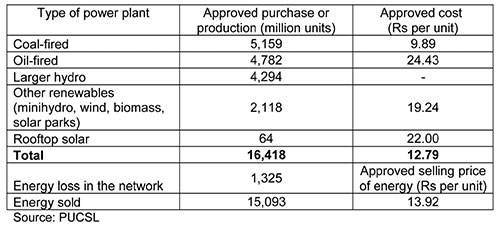 In the absence of Sampur (PUCSL’s letter signed by Chairman Saliya Mathew confirmed cancellation and asked CEB not to build it), PUCSL approved electricity to be produced at Rs 21.59 and sold at Rs 17.02 per unit. The annual loss would be Rs (21.59 – 17.02) x 15,093 = Rs 69 billion per year of approved financial loss. Sri Lanka has a Telecom regulator, an Insurance regulator, a Banking regulator, who never approve prices below costs. Sometime ago the telecom regulator asked the operators to raise the prices, when operators were proposing to reduce prices amidst a price war. But the electricity industry regulator is different: he approves costs amounting to 27% more than the price, not just once but, but continuously for ten long years !
In the absence of Sampur (PUCSL’s letter signed by Chairman Saliya Mathew confirmed cancellation and asked CEB not to build it), PUCSL approved electricity to be produced at Rs 21.59 and sold at Rs 17.02 per unit. The annual loss would be Rs (21.59 – 17.02) x 15,093 = Rs 69 billion per year of approved financial loss. Sri Lanka has a Telecom regulator, an Insurance regulator, a Banking regulator, who never approve prices below costs. Sometime ago the telecom regulator asked the operators to raise the prices, when operators were proposing to reduce prices amidst a price war. But the electricity industry regulator is different: he approves costs amounting to 27% more than the price, not just once but, but continuously for ten long years !
That is 370 million dollars per year as of 2019, the economy is spending, and for years to come, to burn oil (and say we have saved the environment). Did the Minister of Health say we are short of 160 million dollars to buy 40 million doses of the vaccine? Well, being a former Minister of Power, she now knows which Presidential “order” of 2015 is bleeding the economy of 370 million dollars per year, adequate to buy all vaccines and donate an equal amount to a needy country.
Prices are the production costs approved by PUCSL for 2019. The selling price approved by the same PUCSL was Rs 9.27 per unit.
Opinion
Confusion on NGOs and NSOs in Sri Lanka
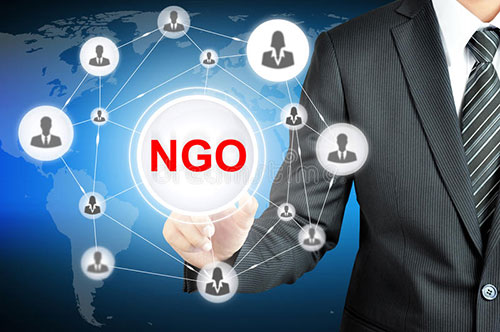
If you listen to politicians and journalists here, you will hear of that curious creature rajya novana sanvidane, a Non-State Organization (NSO). Where do you get them? In the uninstructed and dead minds of those who use those terms. In the real world, where politicians and journalists have developed minds, there are Non-Governmental Organizations (NGO). The United Nations is an organization set up by state parties, not by governments. It is true that agents of states, governments, make the United Nations work or fail. Governments may change but not the states, except rarely. When Eritrea broke away from Ethiopia, a new state was formed and was so recognised by the United Nations. However, the LTTE that tried to set up another state was crushed by the established state that it tried to break away from, and the UN had nothing to do with them.
This entirely unnecessary confusion, created out of ignorance, is so destructive that organizations completely loyal to the existing state, are made to be traitorous outfits, for they are ‘non-state organizations’ within the state. There are citizens of each state, but no citizens of any government. Government is but an instrument of the state. In most states there are organizations, neither of the state nor of government: religious organizations including churches. But none of them is beyond the pale of the state.
Those that speak of rajya novana sanvidane give that name partly because they have no idea of the origin of non-governmental organizations. NGOs came into the limelight, as donor agencies, noticed that some governments, in East Africa, in particular, did not have the capacity and the integrity to use the resources that they provided. They construed, about 1970, that NGOs would be a solution to the problem. Little did they realize that some NGOs themselves would become dens of thieves and brigands. I have not seen any evaluation of the performance of NGOs in any country. There was an incomplete essay written by Dr. Susantha Gunatilleka. NGOs are alternatives to the government, not to the state.
Our Constitution emphatically draws a distinction between the government and state, and lays down that the President is both Head of Government and Head of State (Read Article 2 and Article 30 of the Constitution.) It is as head of state that, he/she is the Commander of the Armed Forces, appoints and receives ambassadors and addresses Parliament annually, when a prorogued Parliament, reconvenes. He/she presides over the Cabinet as head of government. The distinction is most clear, in practice, in Britain where Queen Elizabeth is the head of state and Boris Johnson is the Prime Minister and head of government. However, in principle, Johnson is the Queen’s First Minister appointed by the sovereign, and resigns by advising her of his decision to do so.
In the US and in India the term ‘state’ has special significance. In India there is a ‘rajya sabha’ (the Council of States) whose members represent constituent States and Union Territories. Pretty much the same is true of the United States. In the US, executive power is vested in the President and heads the administration, government in our parlance. The Head of State does not come into the Constitution but those functions that one associates with a head of state are in the US performed by the President of the Republic. The US President does not speak of my state (mage rajaya) but of my administration, (mage anduva). Annually, he addresses Congress on the State of the Union. Our present President must be entirely familiar with all this, having lived there as a citizen of the US for over a decade. It is baffling when someone speaks of a past state as a traitor to that same state. It is probable that a government was a traitor to the state. ‘Treason against the United States, shall consist only in levying war against them, or in adhering to their (States’) enemies, giving them aid and comfort’. That a state was a traitor to the same state is gobbledygook.
Apart from probable confusion that we spoke of in the previous paragraph, it is probable that a president and other members of a government, including members of the governing party here, find it grandiloquent to speak of his/her/their state (mage/ape rajaya), rather than my government (mage anduva) or Sirisena anduva’ and not Sirisena state; it was common to talk of ‘ape anduva’ in 1956; politicians in 1956 were far more literate then than they are now.
When translating from another language, make sure that you understand a bit of the history of the concept that you translate. A public school in the US is not the same as a public school in the UK.
MAHADENAMUTTA









